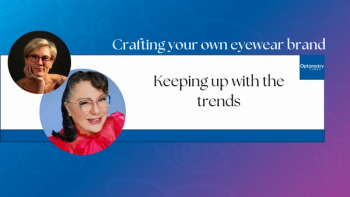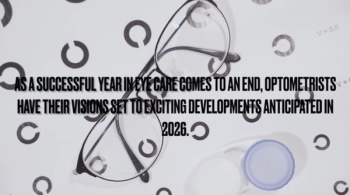
Growing up in optometry and carving my own path
This initial blog falls squarely into the tale-telling category of “why I love optometry,” but I feel this particular tale is a great way to introduce myself.
The views expressed here belong to the author. They do not necessarily represent the views of Optometry Times or UBM Medica.
STUDENT STANDPOINT
Hey, friends! New kid on the block, here! I’m Shelby May, an incoming third-year student at Southern College of Optometry (SCO). For students, the overarching goal of this blog is to offer perspective, advice pieces, and a bit of tale-telling. For ODs, I’m hoping these writings trigger at least some reminiscent humor of studenthood.
This initial blog falls squarely into the tale-telling category of “why I love optometry,” but I feel this particular tale is a great way to introduce myself.
Related:
Growing up in optometry
There are few memories of my childhood that do not involve optometry. My dad was a student at SCO, and we ate, slept, and breathed based on Dad’s school schedule. Dad took Mom and me to SECO every year because, bluntly, family vacations as a grad student are expensive and conventions cost less.
I would be introduced to a few hundred people with tiny handshakes and many, many pieces of candy. Dad would let me wear his name tag with the shiny, soft ribbons hanging off the bottom. I said next to nothing, my head on a swivel, taking in all that the booths offered in what my parents called “record mode.” Back at the hotel, I would talk non-stop about everything I had seen. I loved every moment, but ultimately the experiences were tailored to Dad.
My father never pushed me into optometry, but like so many other children of optometrists, I found myself disappointed with anything else. Still, I worried about seeming like an heir to the title.
When I started at SCO, I never felt as if SCO owed me anything. I kept quiet to avoid seeming haughty or entitled. It felt (and sometimes still feels) like I was standing in a long shadow. Throughout the first and second year, school felt like a dream played at Mach speeds.
The words I lived by were:
• Just learn the task, pass the test, practice, repeat.
• Keep your head down; there will be time to decide later what you think later.
• For now, get the grade.
I finally looked up to find myself halfway through school, past clinical checkouts, and in an exam room with a breathing, living, actively complaining patient. That, too, passed like a blur, though (It took two hours, but who’s counting). I was glad to be seeing real patients, but it still didn’t feel like my own success.
Related:
My turn to shine
I held the head-down mentality even through packing my bags for the American Optometric Association’s (AOA) Optometry's Meeting without much thought about the future. When I arrived, I realized I wasn’t sure how to attend the convention as myself instead of as my father’s daughter.
I can pinpoint the exact moment my viewpoint shifted. I had just registered and received my nametag, and I was walking over to the ribbon board. I pulled a student ribbon, a school ribbon, and an American Optometric Student Association (AOSA) ribbon from a colorful wall of achievements.
About halfway between the assembly tables and the ribbon wall, my face got hot and my heart skipped as an idea dawned on me. These were my ribbons. Each was a flag for a tiny success, things that were mine because I worked for them, not because I was born into them. I proudly stuck them all to my badge.
After that realization, I walked the exhibit hall with new eyes. I visited the booths with a genuine curiosity for how to design an office and what technology I wanted. I weighed the pros and cons of eventually owning my own practice, and in what setting. I pondered what brands applied best to the demographics of my ideal location. I found myself being able to see my future as an optometrist.
I discussed and shared with peers in a way that was new and exciting. I still enjoyed the candy and ribbons-truth be told. Later, I met Dad in the exhibit hall, and as we came across his colleagues, he introduced me as not just “my daughter, Shelby” but as “my daughter, Shelby, a third-year.”
Related:
Full speed ahead
Several important things have become much clearer after the convention. I figured out what I want to specialize in, and I started planning a series of life goals that don’t give off such short-sighted caveman vibes.
“Go to school. Do not fail. Become optometrist,” has become:
• Finish school.
• Get on your feet and gain confidence at this location.
• Develop a skill to a level of excellence that is career defining.
• Consider opening an office at this point. Maintain advocacy for our profession.
I feel like a switch was thrown in my brain. To clarify, I have not been granted superpowers. My grades did not skyrocket in a moment of abrupt genius, and some subjects-looking at you, Neuro-are not good enough yet. More importantly, I have found a passion and a pride to power the next two years of hard work and refine those shortcomings.
Thank You
If you are a student, this post is hopefully a mirror for a moment that has already happened to you. I’m not saying to go to a convention to achieve enlightenment, but I highly suggest finding a way to make your victories feel real and valuable. The convention just happened to be my catalyst.
Perhaps you are so talented that you never doubted, and the OD after your name was always real to you. Inversely, school might still feel like drinking from a firehose. If you don’t yet appreciate that you are being molded into a wonderful thing, that’s totally okay, but don’t forget to live in the moment. This is an amazing process worth occasionally patting yourself on the back for your work.
If you are already an OD, this post is a love letter. Thank you for creating a field and a family that supports each other. Thank you for loving your job, your patients, and your peers so much. Your dedication is undoubtedly a factor in a long list that draws the harshest of critics-your own children-to join you in this wonderful profession.
Future posts will likely be lighter in tone and stronger in substance. Until then, happy studies!
Newsletter
Want more insights like this? Subscribe to Optometry Times and get clinical pearls and practice tips delivered straight to your inbox.










































